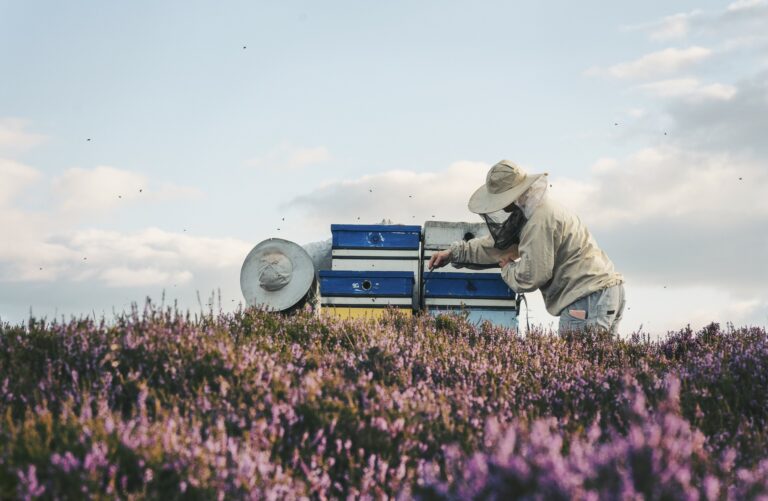Beyond the Jar Part 3:
Eco-Friendly Honey from Scotland

We spoke to Andrew Zalewski, beekeeper-in-chief at Edinburgh Honey Co. ‒ an independent, family-owned company with 60 years of beekeeping traditions. Edinburgh Honey Co. produces honey sustainably and responsibly from their apiaries in Scotland and from family apiaries in Poland, and with the aim to minimise their impact on the environment and promote the protection of bees.
Tell us about yourself?
I am the co-founder of Edinburgh Honey Company, the head beekeeper, the web designer, and the marketer ‒ I do a lot of things here, but the biggest joy is the bees. We started in 2017 with 30 hives, and right now we have 250 hives all over Scotland. We are doing the best we can to support our bees.
How did you get into beekeeping?
It is a family tradition. My grandpa started in Scotland during the second world war. I was born in Poland, I was a city boy who wanted to be a chef, and for me as a child it was a chore. My parents would drop me off at my grandparents during the summer, and I would have to help. For me it wasn’t the greatest experience, I would rather go to the lake and have fun rather than spend the hot Polish summer in a beekeeping suit made out of the old bags used for grain. I did become a chef for over a decade, but after my grandfather passed away this sort of came to life out of nowhere. I’ve sort of fallen back into beekeeping and the honey business, and now it’s the greatest joy I have in my life. The better they are doing, the happier I am. Not for the commercial reasons, the honey is just a by-product of the whole operation, looking after the bees is the greatest joy.
What is your overall mission?
To support bees and help them be the best bees they can be. As a beekeeper your main task is not to do any harm because the bees will manage themselves, they have for hundreds of millions of years without humans being involved. Trying to help them thrive, that’s the primary goal. We do that through a lot of different little things. For example, we recycle all our cardboard and wood and we don’t use any plastic in our packaging, from the label on the jar to the shipping boxes, sellotape, any form of cushioning ‒ everything has to be plastic free. We can’t remove all the plastic from our jarring equipment as we have to meet the norms of food safety regulations, but we don’t use single-use plastic. Even our honeycomb is packed in biodegradable film made out of carrots. We’ve implemented this rather than cheaper and more convenient plastic solutions.
Is Edinburgh Honey Co. still a family affair?
Yes. We import honey from Poland from my grandfather’s heritage apiary which is run by my cousin right now, so it is still family connected. And we implement Polish techniques and Polish hives in our Scottish apiaries, as it is more cost efficient. Although we don’t import the equipment, we have built everything ourselves, and we tend to design all of our beekeeping equipment from scratch. For example, this year we are starting to breed our own line of queens to maintain the quality and the health of the bees, and for that we had to create our own mating nucs, and we’ve just designed it ourselves. We took into account what resources we have and built our own boxes out of an insulating material that is made of reclaimed plastic, which is another layer of the daily activities we do to be a zero waste and plastic free company.
Why is being a plastic free company important?
That’s the only way. When sediments of plastic are found in the future, I don’t want our civilization to be known for leaving that behind. The environment is polluted enough. We need to do more to clean it and fix what previous generations have done. It’s all about the little steps, not grand gestures but everyday efforts to do what we can do to minimise our emissions and plastic consumption. For example, we are switching to all electric vehicles this year to reduce our emissions of CO2. It is all about maximising your efficiency and reducing your impact on the environment.
What bees do you keep?
We have four subspecies of honey bee, including the native black bee and our heritage bees from my grandpa’s apiary. We are trying to achieve a bit of a combination between all the positive characteristics we have from all those subspecies of honey bee.
Why do you promote natural beekeeping methods?
I’m a big fan of old literature when it comes to beekeeping. Part of that was my grandfather’s notebook which is a sea of knowledge. You have to understand the origin of the bees in nature. Bees are woodland creatures. Jan Dzierzon was the founding father of commercial beekeeping in the world. He was a nineteenth century Polish scientist who designed the first successful movable-frame beehive. In his work he always highlighted that in order to preserve the wellbeing of the bee you have to mimic the natural environment. It is important in your beekeeping practice to maintain this connection for the bees with nature. The almond pollination in California for example is completely unsustainable and unnatural. It’s a monoculture ‒ there is no diversity there. They are not getting the nutrients they could get from a wildflower meadow but just one single type of protein from one single type of flower. You move the bees thousands of kilometres to feast on one protein only and you have to subsidise with sugar syrup. There is nothing wrong with sugar syrup being given to the bees for winter but if you are going to make it their primary source of carbohydrate year-round you will end up with heavily malnourished bees. In our woodland 80-85% of the trees are bee friendly and sheep pastures surround it so there is clover, and heather moors less than a mile away. So the bees have very diverse food sources. Heather is considered as good, if not better than Manuka honey.
What is special about the relationship between humans and bees?
Fragility. The bees, as feisty as they are, are tiny little creatures at your mercy and beekeeping creates empathy. You take the responsibility and ownership of these creatures which you have no control over. You are a caretaker of an animal which is completely free to do whatever they want. They have no emotional connection to you but yet you love them. Any other farm animal would develop an emotional connection to you, but bees will not do that. But you still want the best for them, and for me that is the strongest connection.
What are your plans for the future?
We are in the process of securing eight acres of woodland for a bee farm halfway between Glasgow and Edinburgh with beautiful scenery overlooking the Pentland Hills and the Scottish Highlands. We are planning to build a pond for the water based insects and plant 300-400 fruit trees and 150 honey giving trees, and a lot of lavender and thyme to turn it into an insect sanctuary for all the pollinators there are. We are going to build a walled garden to produce organic vegetables for the local community. The farm will be completely net zero ‒ we will have our own solar farm on site and we will use ground heat as well as a source of energy. We want to start running our beekeeping workshops there and build our house, and use the beekeeping as an excuse to move to the countryside. It’s also about creating a place for the community to come and learn and discover the world of honey and the bees and the important work they are doing for us.
What can consumers do to act more responsibly?
Don’t buy in plastic. Plant seeds everywhere and don’t mow your lawn ‒ for the bees but also for other insects. From a commercial point of view it could be the end of my business, but I believe people should have their own hives so they can eat local honey and reduce dependency on imported honey.
How can people support you?
They can buy the honey, that would be the easiest way! They can follow us on social media (Instagram, Tiktok, YouTube).
Discover more about Edinburgh Honey Co.:
Website – http://www.edinburghhoney.co.uk/
Facebook, Instagram, YouTube, Tiktok – @edinburghhoneyco
Twitter – @edinburghhoney


